Half Of Iran’s Locomotives Are Worn Out And Grounded

Iran’s Railway Company says about half of Iran's locomotives are grounded, noting that out of 950 locomotives, only about 500 are active.

Iran’s Railway Company says about half of Iran's locomotives are grounded, noting that out of 950 locomotives, only about 500 are active.
Confirming the figures, the country’s Roads and Urban Development Minister Rostam Ghasemi says Iran faces a severe shortage of freight rail fleet, adding that the sector needs at least a thousand locomotives.
According to an article by the Shargh Daily on Thursday, Ghasemi said that the lack of functioning locomotives has led to long delays in delivering materials for steel, iron smelting, copper and mines industries.
He added that delays of more than 20 days in transporting cargos have reduced the production capacity of some factories and disrupted heavy industries.
The article says the country needs to transfer about 300 million tons of cargo only in the steel sector, but the total volume of cargo transferred in Iran's railway system barely reaches 40 million tons.
Criticizing Iran’s old and ramshackle locomotive fleet, the article said the minimum speed of freight trains in the world is about 80 kilometers per hour but in Iran it is about 20-25 km/h.
In addition to the rail system, an Iranian lawmaker said earlier this month that due to sanctions on the country the quantity and quality in Iran's aviation sector is also decreasing day by day.
Criticizing Roads and Urban Development Ministry, Alireza Pakfetrat, the representative of Shiraz in the parliament, said the ministry is spending most of its time and budget on housing projects and forgets that the aviation industry is also part of its responsibilities.
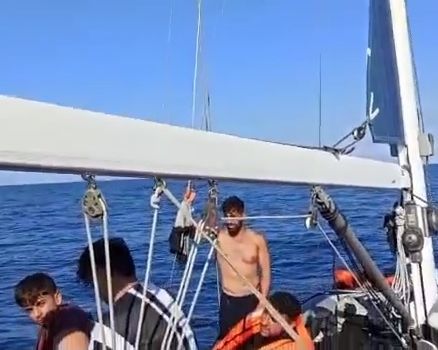
A boat with about 85 Iranian and Afghan passengers, including 30 women and children, has been stranded in the Mediterranean waters, Iran International has learned.
According to the pictures, videos and audio files obtained by Iran International, about 70 passengers of the boat, which set off its journey on Wednesday, August 24, are Iranians.
The boat has been stranded in west of Greece since Thursday due to an engine failure and one of the asylum seekers in the videos says that they have contacted the Greek and Italian coast guards, but no one came to their aid. The refugees on the boat said that they have run out of food.
One of the relatives of the asylum seekers, who lives in Denmark, told Iran International that the boat left from Turkey.
In the videos, some refugees are seen who are trying to swim to reach the nearest shores.
Last December, Hengaw Organization for Human Rights reported that at least eight Iranian Kurdish refugees died as they aimed to escape from Iran to Europe in the past several months.
Iranians – who have a long history of emigration, particularly since the 1979 revolution -- constitute a large number of migrants who begin trying to reach the UK by undertaking dangerous journeys across the English Channel, as well as to Europe through the Mediterranean Sea.
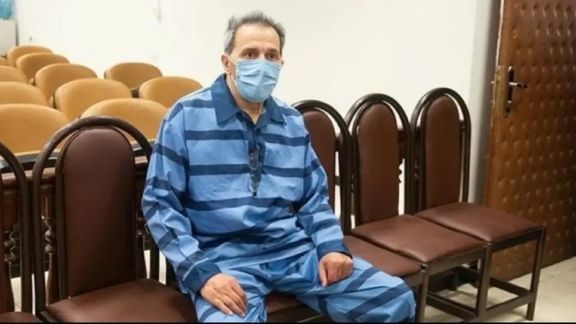
The German Foreign Ministry has confirmed that the Iranian government has detained a German citizen about 40 days ago.
In response to an inquiry by Radio Farda, the ministry said the Islamic Republic has arrested the 66-year-old tourist more than a month ago over accusations of "taking pictures of prohibited areas".
According to information obtained by Radio Farda, he had travelled to different cities across Iran, including Tehran and Tabriz, by a motorcycle.
The German national was arrested more than 40 days ago, and spent about half of it in solitary confinement. He is now imprisoned in the general ward of Aran-o-Bidgol prison near Kashan in the central Esfahan (Isfahan) prison.
The German authorities were informed of his arrest after his daily communication with his family was cut off on social media networks, and with the follow-up of the family through the German embassy, it was found that he was arrested in Aran-o-Bidgol, a tourist destination at the edge of Iran’s central desert.
The German Foreign Ministry did not mention the reason for his trip to Iran, or the exact time of his arrest, but it confirmed that Germany has consular access to this imprisoned citizen.
The spokesman of the German Foreign Ministry emphasized that he could not disclose more details in this regard, and Iran's judicial and security authorities have not yet announced the arrest of the German citizen.
At least four German citizens are jailed in Iran, including Nahid Taghavi and Jamshid Sharmahd. Taghavi, 67, a German-Iranian rights activist is imprisoned since October 2020 and is sentenced to 10 years, while, Sharmahd, 66, is kept in isolation at a secret location since he was snatched by Iranian agents while travelling to India in August 2020. Sharmahd is accused of involvement in a 2008 mosque bombing in Iran that killed 14 people.
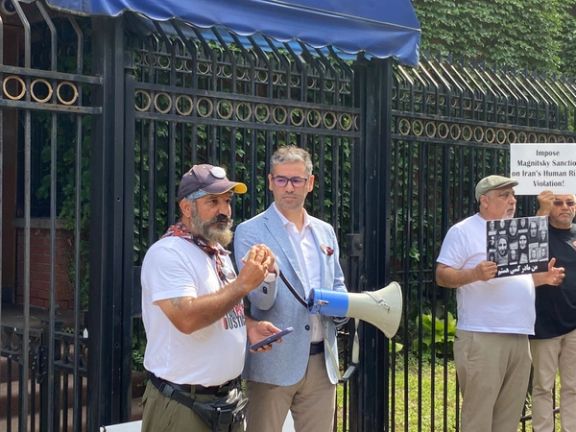
The father of one of the victims aboard Ukrainian Flight 752, which was shot down by Iran’s missiles in 2020, has arrived in Ottawa after marching for over two weeks to meet Canada’s premier.
Mehrzad Zarei, father of 17-year-old Arad who died in the shootdown, who had started his symbolic 400-kilometer march from his son's grave in Richmond Hill, Ontario, arrived in Ottawa Thursday hoping to personally deliver his protest letter to Prime Minister Justin Trudeau.
With Trudeau out of town, Zarei held a meeting with parliamentary secretary to the prime minister Greg Fergus instead. Family members of other victims from Flight 752 who held photos of their loved ones and remained outside the Prime Minister's Office.
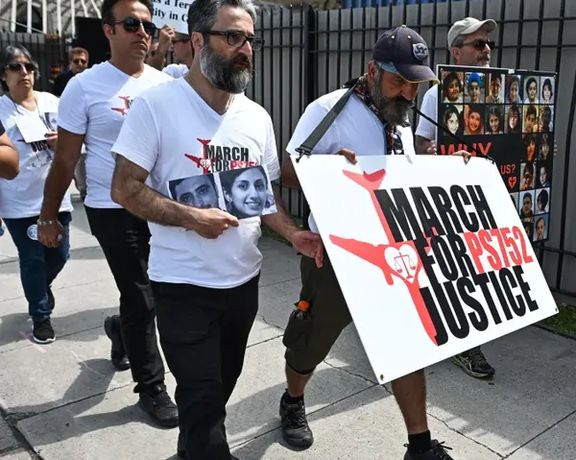
"Today's message, we say, enough is enough," Zarei told reporters before the meeting, and went on to read his letter addressed to Trudeau.
Criticizing a lack of justice for the victims of the incident, he demands that Canada designate Iran’s Revolutionary Guard as a terrorist organization, as was stipulated by a Canadian parliament's resolution in 2018. Other demands include Canadian sanctions on Iranian authorities and for the case to be pursued at the International Court of Justice, and The International Civil Aviation Organization (ICAO).
Having planned a sit-in in front of the parliament, the family members will return to Ottawa on October 4 to mark 1,000 days since the flight was shot down and to renew their calls for justice.
The airliner was shot down by two air-defense missiles fired by the IRGC on January 8, 2020, as it took off from Tehran’s Imam Khomeini International Airport. Only hours earlier, the IRGC had fired more than a dozen missiles at Iraqi bases hosting US and coalition troops in retaliation for the killing of the IRGC Qods Force Commander Ghasem Soleimani who was killed in Baghdad by a US drone strike just five days earlier.
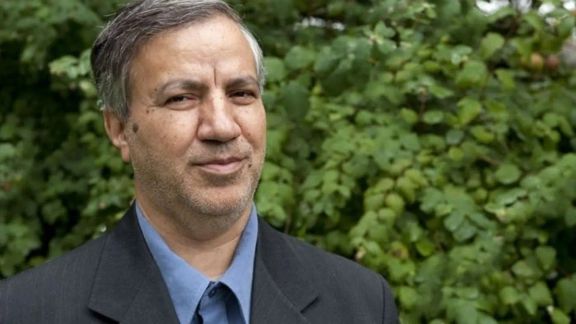
A rights organization has filed a complaint in Britain against a former Iranian official, now living in the UK, for having defended Salman Rushdie’s execution.
Justice for Iran, a London-based non-governmental human rights organization, filed its complaint against Iranian politician and author Ataollah Mohajerani for incitement to terrorism in a 1989 book, Critique of the Satanic Verses Conspiracy, and for defending a death fatwa for blasphemy against Rushdie by Iran’s late leader Ayatollah Ruhollah Khomeini.
“Almost all Muslim schools of jurisprudence share the view that whoever insults the prophet deserves to be killed. His repentance cannot be accepted,” Mohajerani, who was also a cleric in Iran, wrote in his book in which he called the Indian born British writer an “apostate”.
The complaint was filed with the counterterrorism unit of UK police on August 16 against Mohajerani, a British citizen who resides in London, Shadi Sadr, human rights lawyer and one of the Co-founders of Justice for Iran told Iran international Thursday [August 25].
British officials have not yet commented about the complaint filed against Mohajerani.
Some Iranian public figures have alleged that western governments’ “forbearance of the Islamic Republic’s terrorist activities and hatemongering” paved the way for the recent knife attack on Rushdie in the United States while others have accused Mohajerani of defending Khomeini’s fatwa and being an apologist for the Islamic Republic.
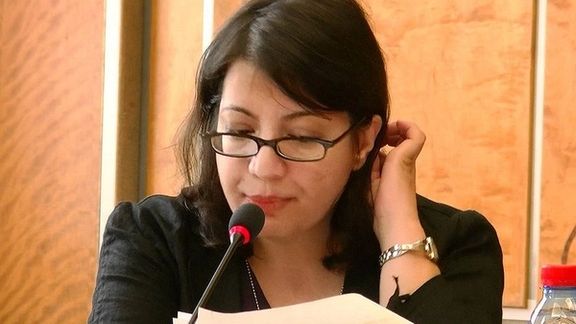
“How is it possible that the British government allows a former official of the Islamic Republic of Iran to live in the UK and call for the murder of a British citizen. Mohajerani still defending the fatwa against Salman Rushdie,” Masih Alinejad US-based activist Masih tweeted August 15.
In a series of tweets after Rushdie's stabbing, Mohajerani, a former vice-president and minister of culture and Islamic guidance, implicitly defended writing the book in praise and justification of Khomeini’s fatwa, describing the royalties from the book’s sales as “legitimate and sweet”. Mr. Mohajerani has refused talking to Iran International and other foreign based Persian language media.
Mohajerani later tweeted to deny that he approves of the attack on Rushdi and called the attempt on his life a ‘tragic incident’ but also said he hopes that the British author will cease “insulting prophets and religions during the rest of his life”.
He has responded to the possibility of being investigated by the British authorities and a trial by saying that this will provide him with a “golden opportunity” that he is ready to exploit.
Sadr told Iran International that her organization consulted a group of expert British lawyers about the case before filing its complaint. “The British lawyers said Mohajerani’s writings are evidence of “incitement of terrorism” and “sharing terrorist content”, she said.
Sadr added that the lawyers who were provided with the English translation of Mohajerani’s writings and recent tweets on the attempt on Rushdie’s life in New York in August filed the complaint with the British authorities on behalf of Justice for Iran.
Iran's hardliner media doubled down on praise for the attack on Rushdie as many condemned the stabbing by a man allegedly sympathetic to Shiite extremism.
Khomeini's death fatwa against Rushdie resulted in several failed assassination attempts against him as well as his publishers and translators. Satanic Verses’ Japanese translator, Hitoshi Igarashi, was killed, its Italian translator, Ettore Capriolo, was seriously injured in a stabbing attack, itsNorwegian publisher,William Nygaard, was shot, and an arson attack by a fundamentalist mob against its Turkish translator, Aziz Nesin, at a hotel in Sivas, Turkey, in 1993 led to the death of 37 people. Nesin narrowly escaped.
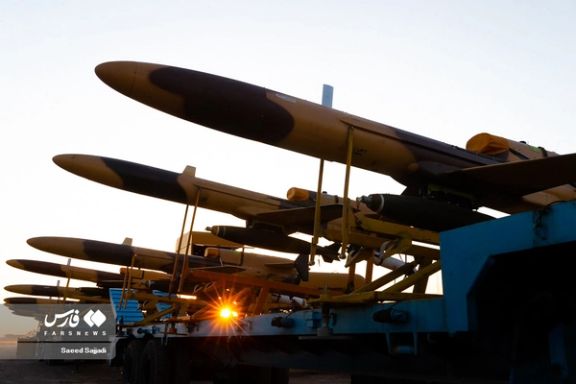
Western intelligence officials say Russia has obtained hundreds of Iranian drones capable of being used in its war against Ukraine despite US warnings to Tehran against the move.
It is not officially announced whether Russia has begun flying the drones against Ukrainian targets, but the drones appear to be operational and ready to use, said the officials, who spoke to the Associated Press on condition of anonymity to discuss sensitive intelligence.
The reported shipment marks the latest sign of what appears to be closer military cooperation between the longtime allies, which are also broadening their relations in other sectors such as space programs, aviation and automotive industry.
It also underscores warnings from critics of the ongoing negotiations with Iran to revive the 2015 nuclear deal that the United States left in 2018. An agreement, which would grant Iran billions of dollars in sanctions relief in return for curbs on its nuclear program, is inching forward.
In mid-August, Iran’s Revolutionary Guard confirmed that it held joint drone exercises with Russia at the Kashan Air Base, adding that Belarus and Armenia were also partaking in the drills.
Earlier in the month, US-based think tank, the Institute for the Study of War quoted advisor to the Ukrainian President’s Office, Oleksiy Arestovych, as saying that Iran handed 46 drones over to Russia and that the Ukrainian government has already noted the use of these drones in combat in Ukraine.
Late In July, an Iranian lawmaker said military cooperation between Tehran and Moscow has upset the political equations of the global order, confirming Russia’s request to buy Iranian drones.